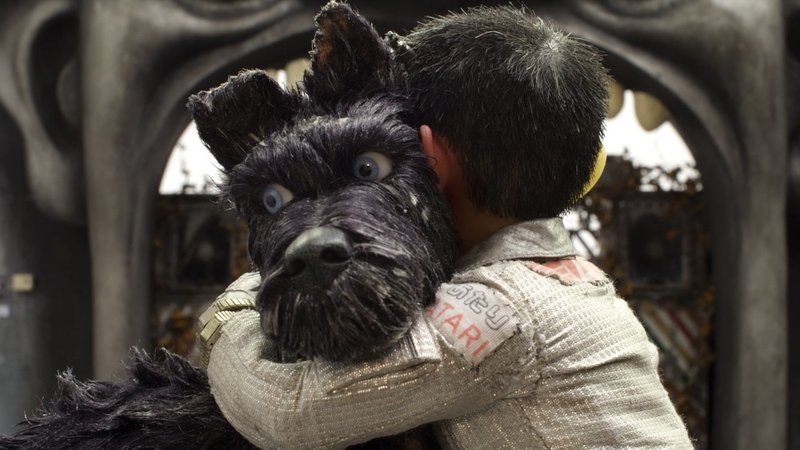What ever happened to man’s best friend?
How Wes Anderson’s “Isle of Dogs” tells his story of loving a culture he doesn’t understand
When I was ten years old, The Fantastic Mr. Fox was my favorite movie without debate. I dragged various family members out to see it at least three times. Its animation and dialogue had a charisma to it that had me wide-eyed and enthralled every time, even if I knew the movie as well as the shoes on my feet.
So, of course, the trailer for Isle of Dogs that dropped in late fall of last year served as tinder for a spark of childhood love that I had forgotten about. This would be director Wes Anderson’s first animated film since 2009, and his return to the world of stop motion left me with a movie that made me feel like a kid again.
So this seems like a good time to say that this is not a kid’s movie.
It has its PG-13 rating for a reason. Within the first twenty minutes of the movie a dog gets his ear ripped off and a 12 year old boy pulls a steel rod partially out of his skull, which had been embedded there in a plane crash. But another, equally important reason is that it puts children watching it at about the same age of one of the key characters, Atari Kobayashi (the aforementioned twelve year old boy). Thirteen is, for most people, right on the border between childlike whimsicality and adult responsibility. An appreciation for both maximizes enjoyment for the movie, in my eyes.
Now that it’s been established how this movie should be enjoyed, let’s talk about what there is to be enjoyed.
Its shining points are the same things, for me, as the ones for The Fantastic Mr. Fox: dialogue and visuals. The way the characters talk to each other, whether they speak the same language or not, harkens back to a lot of what I loved about Anderson’s previous animated movie. I feel like the best example is with Chief, the movie’s dog lead. In his conversation with Nutmeg, his love interest, the pauses he takes while talking show his awkward tension, especially when compared with the less bumpy speech of his conversational partner. His exasperation with Atari when they wind up stuck together is hilarious, and his anger all throughout the movie displays voice actor Bryan Cranston’s mastery of verbal levels and nuance.
Visuals played a big part in this movie, with its emphasis on wide shots of Megasaki and its buildings, which felt reminiscent of totalitarian Cold War-era architecture. But one man’s trash is another’s treasure, which is taken quite literally with Trash Island. This is the location the dogs in the film are exiled to, and as a sucker for abandoned buildings I couldn’t love the exploration sequences more.
For what’s supposed to be a small island in comparison to mainland Japan, the landscapes felt very large. There also weren’t that many dogs, although hundreds of thousands of them had been exiled there. It was oddly beautiful, but also served as a grim testament to the physical and political corruption that the movie centers around.
Despite how much I loved the film, there are certainly criticisms to be made.
One such thing is the pacing. The film is 101 minutes long, short compared to a lot of the bigger-name films coming out recently. Though I can appreciate that, I can’t help but feel like the film might have benefitted from an extra ten minutes. Toward the middle of the movie the pacing felt very quick, and some of the characters (mostly the dogs) started getting less time on screen in favor of the development of others. Maybe it was a directing decision, or money troubles forced it, but I feel like it will cause me to enjoy the film less when I rewatch it in the future.
A lot of accusations of cultural appropriation have also been thrown around in the wake of the movie coming out, which might not be entirely undeserved. Most of the sequences that focus on Japan are heavily based in tropes; the main villains include a robotics expert, a yakuza boss and a Mao-reminiscent mayor (among others).
Not that sampling from tropes makes Anderson racist, necessarily (I don’t even consider it my position to decide, since I’m not Japanese), but it does make him look a little ignorant of the setting he put his movie in. Despite that though, Anderson has said that he loves Japanese culture and that the movie is his way of expressing that love.
Finally, I feel like cats and cat-lovers got the short end of the stick in this movie. Sure, it makes sense that the dog-hating faction is comprised of them, but it’s uninteresting. Despite what some people would have you believe, cats and their fans aren’t all bad.
Going into Isle of Dogs, I knew there was little chance that I would hate it. And indeed, I do love the movie- but I’m not blind to what’s wrong with it. But if you don’t mind a pace that’s a bit too fast for its own good and a narrative riddled with tropes, you can find a very powerful message in this movie among the smart dialogue and awesome visuals.
Anderson doesn’t understand what it’s like to be Japanese. His knowledge of the island nation comes from what he’s seen in media. But he sure does love what he knows about it.
We can never understand what it’s like to be a dog. It’s as simple as our biology; human brains and dog brains are different. But that doesn’t stop us from loving one another.
Loving something isn’t the same thing as understanding it. But if you love something deep enough- as much as a twelve year old boy loves his dog and that same dog his master- then maybe you can get close.

12
What is your position on the Bagpipe:
Copy Editor
What is your go-to snack:
I pretty much live off of granola bars.
What is your favorite tv show to binge watch:
I haven't really been able to keep up with any TV shows lately.
In what are you involved at HP:
Theatre and PAPR Club
What is your dream job:
writing for NPR
How would your friends describe you:
The tired guy with good comedic timing
What is your favorite song or style of music:
Alternative and Electroswing
What is a fun fact about yourself that not everyone knows:
I acted in a web series during sophomore year that never really took off.
What is one skill at which you were better:
I wish I could play an instrument well.
What is your ideal pet:
A Rhoomba, but one with emotions
What is your favorite class this year:
Creative Writing
Where do you want to go to college:
The University of Georgia
What is your favorite news source:
NPR
What is the best piece of advice you have received so far:
"You'll do better on tests with a full night of sleep than you would if you stayed up all night studying."
If you could attend any major event, which would you choose:
A Caravan Palace concert



